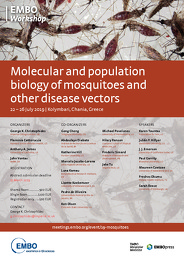About the Workshop
The field of vector-borne diseases is a prime example where basic biological research can have major impacts on a global scale. The control of vector populations and disease transmission are regarded as key components of an international effort to eliminate malaria and other vector-borne diseases. The frequent and explosive recent outbreaks of arboviral diseases such as Dengue, Zika and Chikungunya in South and Central America highlights the need for intensified research towards detailed understanding of pathogen transmission by invasive mosquito species. In this effort, novel technologies such as CRISPR-Cas9 gene editing have helped redesign vector genetic control strategies, whilst other key considerations include the spread of insecticide resistance, understanding and predicting disease transmission through deep knowledge of the vector population dynamics, ecology and behaviour, development of transmission blocking interventions based on advanced knowledge of vector-pathogen interactions, dissecting the impact of environmental changes on the spread of invasive species and the emergence of disease outbreaks. Integration of these different scientific disciplines can dramatically aid vector control and disease elimination. Therefore, continuation of this meeting series is important for the continued development of the field and for attracting new researchers to this area.
Topics: Microbiology, Virology & Pathogens, Evolution and Ecology
About EMBO Courses and Workshops
EMBO Courses and Workshops are selected for their excellent scientific quality and timelines, provision of good networking activities for all participants and speaker gender diversity (at least 40% of speakers must be from the underrepresented gender).
Organisers are encouraged to implement measures to make the meeting environmentally more sustainable.




